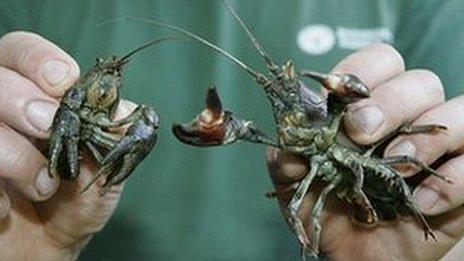American Signal crayfish found in River Nar
- Published

The native white-clawed crayfish (L) is threatened by the American signal crayfish (R)
A potentially devastating species of crayfish has been found in a west Norfolk river, the Environment Agency has confirmed.
The American Signal crayfish, first introduced into Britain in the 1970s, has been spotted in the River Nar.
The bigger and more aggressive species preys on native wildlife, in particular the white-clawed crayfish, threatening its existence.
It also carries a disease, which is deadly to white-clawed crayfish.
The latest location is the furthest upstream in East Anglia they have been found.
'Don't trap crayfish'
People are being urged to report any sightings to the Centre for Ecology and Hydrology, which tracks their movements.
A spokesman for the Environment Agency said: "Once a non-native species is established, it is incredibly difficult to remove them.
"People should not simply try to trap or kill invasive species."
The spokesman said there were strict rules in place to protect native crayfish as well as controlling the spread of invasive, non-native crayfish.
When the Signal crayfish were introduced into the UK, they were sold to farmers looking to diversify into new markets.
Crayfish escaped from these farms and established populations in rivers and lakes.
Since then, there has been a rapid decline in the native white-clawed crayfish.
- Published30 October 2012
- Published27 August 2012